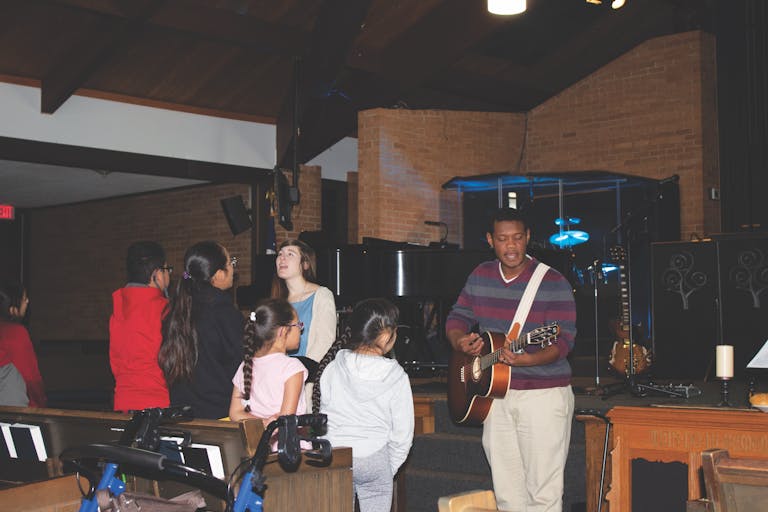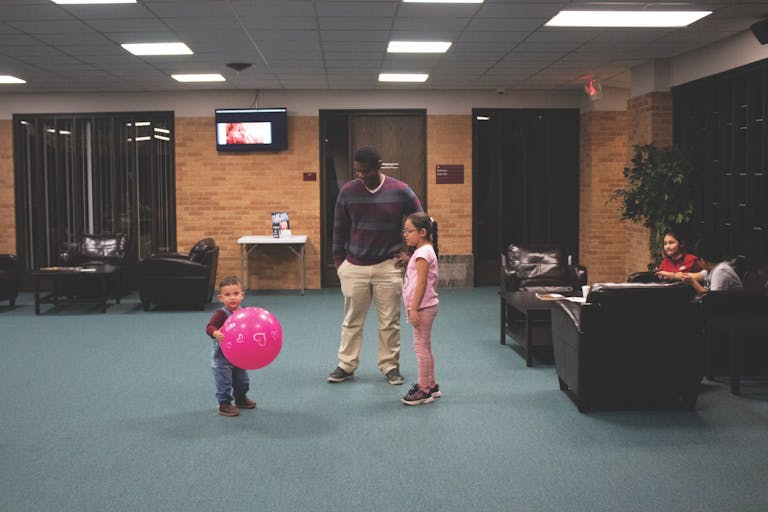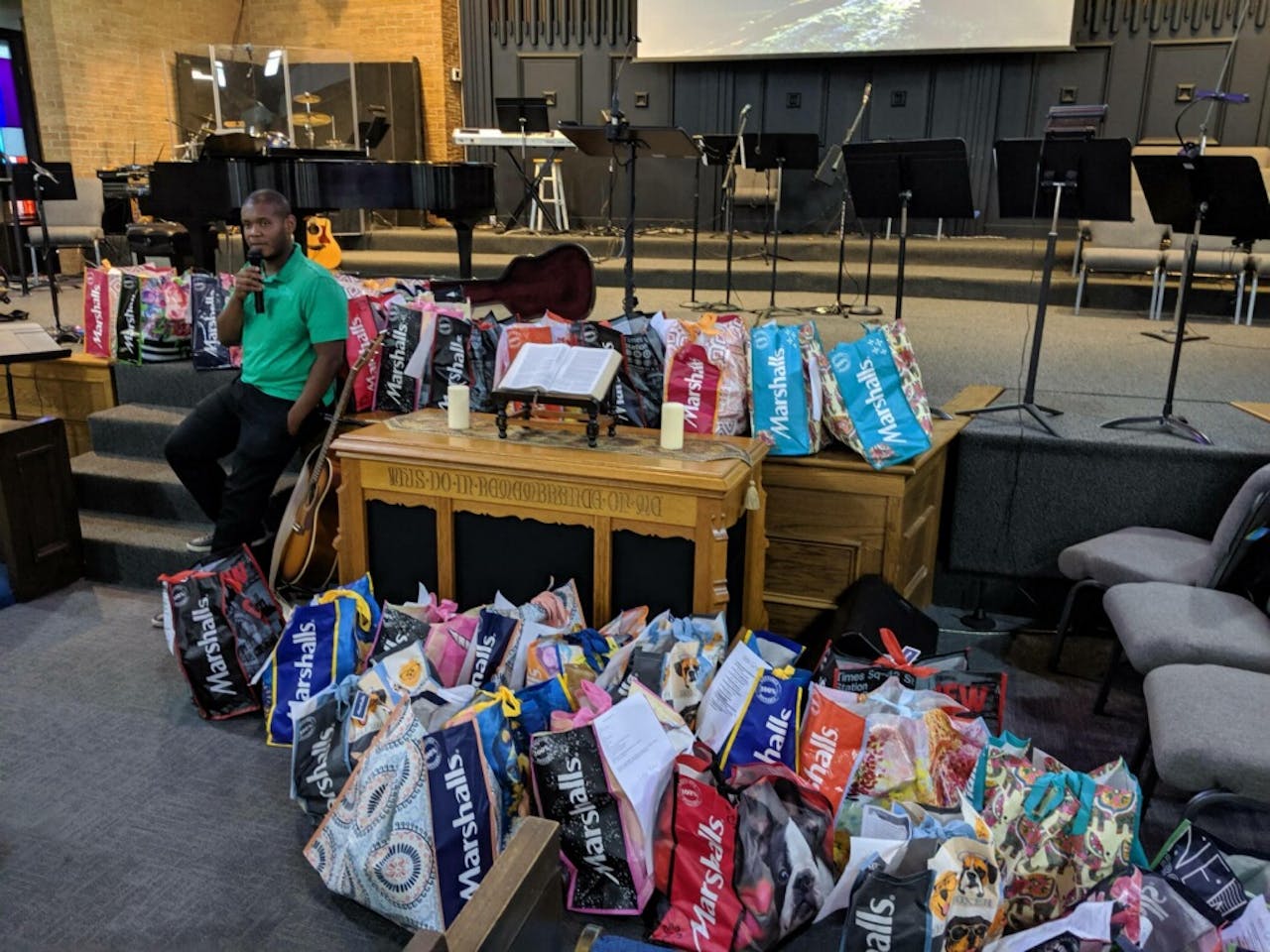Pioneering Pastor
Edward Solano, a Honduran graduate of Mount Vernon Nazarene University, founded the first Spanish-language congregation in Mount Vernon in 2015. It has quickly become a cornerstone of the local Latinx community.
In December of 2013, during a church service, Edward Solano had a conversation with God. God asked Solano why he was studying Computer Science. The answer was simple. Solano, then a student at Mount Vernon Nazarene University (MVNU), wanted to major in something that would land him a well-paying job so he could help support his family back in Honduras; he had just moved to the United States on a student visa.
His decision was, in other words, purely financial. It was then that Solano realized he was going into programming for the wrong reasons. Two years later, Solano would start the first Spanish-language congregation in Mount Vernon.
“I said to God, ‘Pastors don’t make any money, I can’t be a pastor,’” Solano recounted. “God then said to me, ‘So you don’t have faith in me. You don’t trust that I will give you enough to keep going day to day.’ I desperately got down on my knees and told God that I did trust him with all my heart. So I quit being a Computer Science major, I took up Pastoral Ministry, and decided to devote my life to Him.”
I first met Solano, now 24, at the Happy Bean coffee shop in Mount Vernon. He was wearing a light green sweater and sipping on a latté. As he recounted the events that led him to that conversation with God, he blinked methodically, his smile warm and affectionate. He told the story mechanically, but with an air of spirituality - it was hard to tell if he was thinking with the brain of a programmer or with the heart of a spiritual leader.
After all, Computer Science was always a passion that ran parallel to Solano’s belief in God. Back in Tegucigalpa, Honduras, Solano taught himself Java and C++ and eventually took up a position as an assistant programming teacher for his high school. At the same time, he was attending church regularly and studying the Bible. He loved God and the Church but knew that becoming a pastor was an unrealistic goal because of his financial means. “When I was 12 or 13, God sincerely touched my heart,” he said. “I only wanted to learn more about God. At that age, I realized I was always meant for the Church… so it made sense: I would get my degree in Computer Science while I studied God and the Bible; not to become a priest but to learn about God.”
He learned of MVNU through some friends from his high school, who now play for the soccer team at the university; the Christian school would allow him to pursue computer programming while studying the Bible and Christian traditions. In his first semester at MVNU, he achieved A’s in all his computer science classes and earned the highest praise from his professors. Then came the conversation with God.
“When I heard God’s word, I realized my calling: To help others. To be with people. To adore people and adore God. I wanted to help and do what was necessary,” he said. He switched his major to Pastoral Ministry and set himself on becoming a pastor.
Soon after graduating from MVNU, Solano became a Pastoral Intern at Westerville Church of the Nazarene, a Protestant Church located 20 minutes outside of Columbus. There, he applied his Spanish and focused on the Church’s multicultural outreach to attract more Latinx members. “In the Columbus area,” he said, “we worked closely with a lot of Hispanic immigrants.” Solano noted that a lot of them were “in states of poverty and trauma upon immigrating.” His mission was to help them through spiritual development.
Westerville Naz hosts bilingual services in Spanish and English — it’s there that Solano came up with the idea to bring a similar program back to Mount Vernon. At that point, there was one monthly mass held in Spanish in the St. Vincent De Paul Catholic Church in Mount Vernon, but “there weren’t any services for the human development of the Hispanic community,” he said.
Solano connected with other pastors in Knox County while making calls and knocking on the doors of Latinx communities. He did not have a car at the time and walked from door to door telling people in Knox County about his idea.
Soon, the pastor of the First Church of the Nazarene met with Solano and Barbara Martínez, a former MVNU Professor of Spanish and an active member of the Latinx community in Mount Vernon. Martínez had been working with Latinx kids in Knox County through tutoring sessions and academic help. Together, they talked about the possibility of organizing the first Spanish-speaking congregation, or the closest they could get to a Spanish-speaking church within the First Church of the Nazarene. When the pastor of the Church was on board, Martínez and Solano realized that they had an opportunity to not only create a space for spiritual worship for the local Latinx population, but also to create a community where they could help and improve the lives of Spanish-speaking immigrants in Knox County.
“Before Edward [Solano], my main mission was to help [Latinx] kids who were having trouble in school,” Martínez said. “The spiritual wasn’t there before Edward. He brought his wholeness of God into the work.”
Together, Martínez and Solano organized a schedule where they would host English classes at the church on Tuesday and Thursday evenings that are open to any Latinx immigrant. The language program, now known as “HOLA” — an acronym in Spanish that translates to “Hispanics Organized for Language and Amity” - is followed by academic tutoring for Latinx students from grade school to high school. The group also holds communal dinners every Sunday, followed by a weekly Mass led by Solano himself. On the side, Solano started a soccer team for the men in the congregation in order to help them bond.
On October 18, 2015, Solano held his first Spanish-speaking congregation. It was a success: Around 40 people came. Since then, he has had a consistent attendance of about 25 to 30 members every week.
In one of the recent masses last October, the atmosphere of community that Solano had cultivated was palpable. During dinner, Solano introduced new members to the older ones, kids ate chicken and played soccer in the Church living room, and adults mingled and spoke in Spanish.
During the service, Solano invited people in his congregation to share a prayer. There was a moment of silence. Then, one person, in Spanish, spoke out. “I pray for the people in Mexico, who are suffering right now.” Then another person: “I pray for the difficulties in Honduras and Nicaragua.” Others chimed in. “I pray for the people in Honduras, the poverty and the lack of education.” Solano’s eyes were closed, his arms outstretched toward the pews, and his palms facing the sky. He seemed to really feel the pain of this congregation. Then, finally, he brought it all together: “We pray for our countries of origin,” he said, in Spanish. “Amen.”

Solano (right) leading a song | Emily Barton

Emily Barton
Though Solano is young, he carries himself with the air of an old and wise priest. When we met for coffee, he held his hands in front of him, his fingers interlaced. When he preaches, he looks toward the sky with resignation and grievance, as if he were surrendering his soul. “He’s so gentle,” said Martínez when I asked her to describe Solano.
Edward’s soft expression belies the difficulty of his task, however. He told me that, now that he has an important role as a community leader in Mount Vernon, it’s sometimes hard to meet the pressure that is put on him.
Some of these difficulties come from within the group, from the Latinx immigrants themselves. “Because of my age,” he said, “clearly some people will treat me like I am less-than sometimes. As a pastor who is not a father yet, and who has to communicate with Hispanics who usually come from the Catholic tradition, sometimes they treat you a little different at first… It’s funny, sometimes I have to give marriage advice to men who are 57 and have been married for 30 years. I’ve been married for three months.”
Solano takes these criticisms with a grain of salt - there are many others in the community who trust him and put their faith in him, he said. One immigrant who is a Sunday regular, Jose Antonio Gonzalez Acuña, said that Solano has helped him immensely in his personal life as a Latino immigrant in Knox County. Acuña moved to the area two years ago and says that the transition has been easier thanks to Solano. “He’s an adviser. With my marriage, with my anxiety, with my depression. Things that, when you come from a different country, begin to really affect you,” he said.
One of the biggest challenges in moving back to Mount Vernon from Westerville, Solano said, is dealing with the large amounts of systemic racism and prejudice Latinx people must face in Knox County. As a community leader and confidant, he hears a lot of stories from immigrants who face racism, both structural and personal.
The ones that most affect him are the stories involving children. “We have had kids in our community who come to Church and talk about other kids in their classroom that send emails that say, ‘Go back to Mexico, go back to the border. Go back home. We don’t want you here, just get away from here,’” Solano said.
Martínez knows of countless instances of racism and xenophobia in local schools toward Latinx students. She told me one story involving two elementary-school students: “We had one kid tell another kid, ‘When Trump becomes President, I’m going to lift you and throw you over the wall.’” The Latinx student, who was a U.S. citizen, held her ground and calmly replied that she was too heavy for the other student to lift.
Acuña, likewise, told a story of the time when a white man pulled a gun on him and his wife while they were speaking Spanish with each other at the McDonald’s on Coshocton. “He had a gun, he was pointing it at us, telling us to get out of the United States,” Acuña said. “The police had to take him to jail.”
There are also forms of structural racism that Solano has to hear about and counsel on, specifically, Latinx people who have had to overwork themselves for little pay. “We have Hispanics in this town who work 116 hours a week,” Solano said. “And they’re not earning a big salary, you know? It’s an extremely low salary in Ohio.”
This form of overworking directly impacts church attendance and participation, which further alienates Latinxs from the community and each other. Solano’s frustration was palpable when he spoke on this; his gentle expression completely wore off. “If you’re working 116 hours a week, in a job that is physically demanding, and you don’t make much and don’t see your family, and then I tell you, ‘Hey, come take English classes and also attend church,’ you’re simply not going to want to. It’s overwhelming,” he said.
On top of all this, Solano has to divide his time between Westerville, his home in Columbus, and Knox County. There are nights where he doesn’t get home until 10 p.m., and then has to be back in Knox County early in the morning. After his Church service, Solano drops off members of the congregation who don’t have licenses - often because of their legal status - and sometimes has to drive hours away from his own home.
This all places an immense amount of stress on someone who has just graduated college.
Still, Solano finds the work highly rewarding. His eyes lit up as he told me the story of a 50-year-old man who had been living in the U.S. for the majority of his life but couldn’t get citizenship. “He got some help through us, through the HOLA program, and most importantly through God,” Solano said. “He was able to pass his citizenship test, and that was a huge success for me.”

Solano during a donation drive | Courtesy of Edward Solano
In a few weeks from writing this article, Solano will be leaving the Spanish-speaking congregation in Mount Vernon and passing off his role to somebody else. After four years of pastorship, he has decided to bid goodbye to what he started, to all the people he has helped and worked with. It was a decision that didn’t come easily.
When he announced this news to his congregation last October, Solano was met with sighs and cries for him not to leave. “I know, I know,” he said with a half-smile. “I don’t exactly want to leave either, but it’s a decision I have to make.”
He said that he’s done what he can in Mount Vernon and it’s time to close this chapter in his life and open a new one. “I started something really special here, with the help of others. But I feel like it’s time for me to pass on the role to somebody else,” he said. As he spoke, his eyes dropped to the ground and his voice broke a bit.
Part of the problem is the distance - Solano would like to stay in Columbus but he knows that in order for the Latinx community in Knox County to truly feel supported, they need somebody who will be fully present, somebody who is living in the same environment as them. While Solano would like to keep in touch with people in the congregation and everybody he has worked with, he also wants to spend more time with his wife and focus on getting his Master’s degree in Pastoral Ministry.
In the coming weeks, the people in the Spanish-speaking congregation will be voting for a new pastor to take over Solano’s role. Solano will also be approving or disapproving his successor.
His next step is to keep growing the Spanish-speaking congregation into the Columbus area, where he has more immediate access. “We need more English classes and academic help for immigrants elsewhere, too,” he said. He hopes to keep visiting the First Church of the Nazarene weekly and meet with members who still need his support. However, he will be significantly scaling down his visits to Mount Vernon.
I finally asked Solano how he felt about the experience as a whole, what it felt like to be a figure in the community, specifically, in the Latinx community. He rebuked my suggestion - he doesn’t like that kind of label. “I don’t like the language of ‘figure,’” he said, shaking his head. “Partly because I don’t have a good figure myself!” He laughed and pointed toward his belly.
I told him he shouldn’t be so modest. I wanted to know his perspective on working with Latinx people on a spiritual level. “It’s been a beautiful experience, truly beautiful,” he said. “People are not like computers. Working with people is not like working with variables. They’re always changing and multi-faceted.” His programmer side was coming out again.
